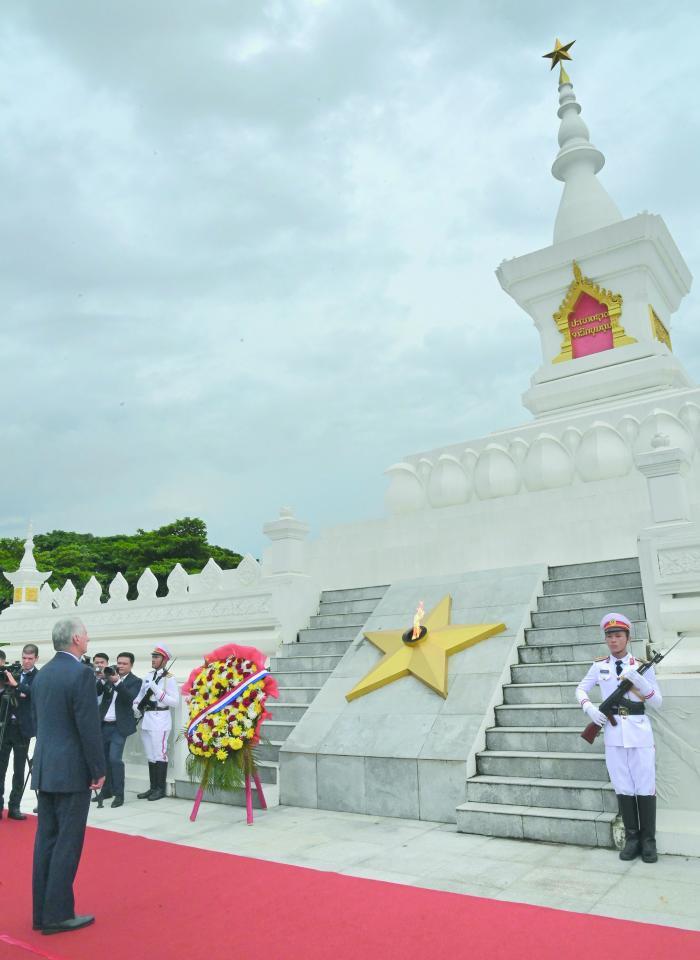
Vientiane.– "Laos will continue to support Cuba on its path to development, will continue to support Cuba in the fight against the blockade, against any isolation that may be imposed on it. And I believe that it is time to strengthen and expand our relations."
Laotian Foreign Minister Thongsavanh Phomvihane, steadfast in his support and affection for Cuba, agreed to answer some questions from the Cuban press corps regarding the state visit made last weekend to the sister Indochinese nation by the First Secretary of the Party Central Committee and President of the Republic, Miguel Díaz-Canel Bermúdez.
Cuba and Laos share a history of arduous struggle for independence and socialism, each country with its own characteristics. How has this ideological and political solidarity been able to bring two countries so distant geographically and culturally so close together?
–We are delighted to have had more than five decades of uninterrupted diplomatic relations with Cuba; it is a very long bond, but it is not just about diplomacy; our history is even longer, it goes back much further, because the Communist Party of Cuba and the Lao People's Revolutionary Party have fought against colonialism and neocolonialism.
Cuba helped us in our struggle for independence when it provided assistance, especially in the area of health, with medicines and doctors who worked in the north, in the areas of revolutionary resistance, in the caves of Viengsay.
"We Laotians greatly appreciate all the support given to us by the Cuban people, the Communist Party, and the Government of Cuba. Since the establishment of the Lao People's Democratic Republic in 1975, Cuba has extended a helping hand to us in building our country and establishing socialism."
But we also have the long-standing historical relations between our two great leaders: Commander-in-Chief Fidel Castro Ruz and President Kaysone Phomvihane, who had a great affinity and shared a friendship.
All of this is something we share, something that cannot be undone. So, even though Cuba and Laos are geographically distant, on different continents, we have been close for quite some time.
–And there is also the training and graduation in Cuba of hundreds of young people, professionals who have undoubtedly contributed to the development of Laos upon their return. In addition, there is fluid cooperation and economic and commercial exchange, although there are still major reservations.
–Since the creation of the People's Democratic Republic in 1975, Cuba and Laos have maintained a permanent educational exchange. Right now, we have several young people studying there. And yes, the young people who have studied in Cuba over the last 50 years have contributed significantly to strengthening friendship, relations, and bilateral cooperation. I believe that Laotians who have graduated in Cuba will continue to be messengers of friendship, continuing to build bridges between the peoples and governments of the two countries.
"This new visit by Comrade Díaz-Canel and his official delegation is very important. We rejoice in the exchange of high-level visits that we have always shared."
"In 1976, the General Secretary of the Lao People's Revolutionary Party, Kaysone Phomvihane, who was also Prime Minister at the time, made an official visit to the island, and since then we have maintained a fluid exchange. Comrade Raúl Castro has been to Laos, as have other senior Cuban leaders, too many to list them all. And in recent years, there have been frequent exchanges between the general secretaries of both parties."
"This visit by Comrade Díaz-Canel is very significant, especially at a time like this, when the situation in the region and on the planet has become uncertain."
"It is difficult to predict what will happen in the world, because even now, when the trend is more toward multilateralism, there are still some ideologies based on unilateralism that contradict the global trend."
"That is why I believe that the time has come for Laos and Cuba to strengthen our relations. Although geographically we are still far from each other, ideologically we are still very close."
"It is true that we have the best relations in many areas, in politics, in parliament, and many others. But we must expand them even further in areas such as trade, investment, and also health, in which Cuba is so advanced."
"I believe that the state visit now made by President Miguel Díaz-Canel will have a very positive impact on expanding our relations."
"My message to Cuba is that we stand by you, that we support you in your ongoing struggle for freedom, in your resistance, in your development. And we do so for the sake of socialism and for the sake of your people."








